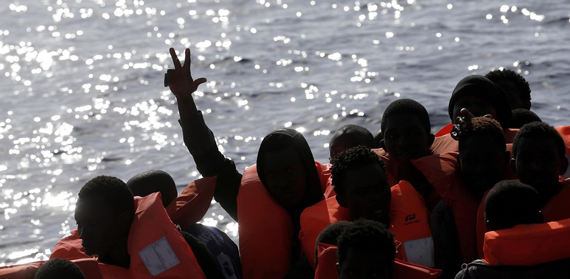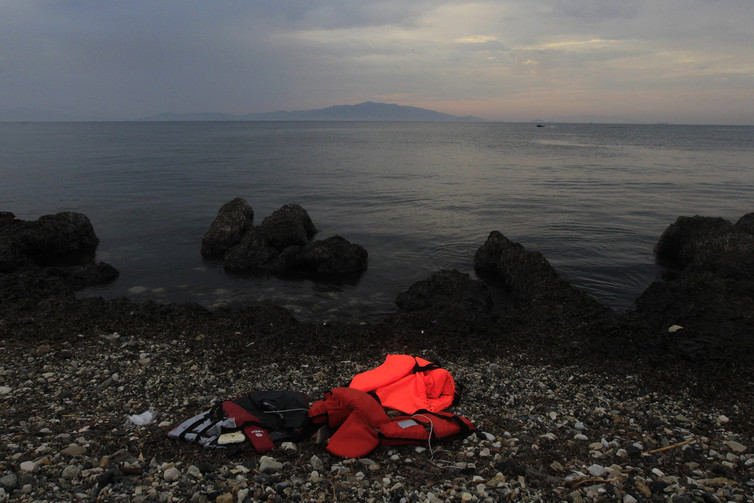A Red Cross rescue mission in the Mediterranean Sea. Italian Red Cross/Yara Nardi/HAN
Guest post by Simon Mchahon and Katharine Jones, Centre for Trust, Peace and Social Relations
Over a million women, men and children crossed the Mediterranean into Europe in 2015. Hundreds of thousands climbed, or were pushed and shoved, into rickety boats in Libya to reach Italy and Malta. Many more did the same in Turkey to reach Greece. In 2016, although fewer people have made the journey, more have died on the way.
According to European leaders, it is smugglers operating within vast transnational criminal networks who are responsible for these movements and ultimately for the loss of life at sea. The answer, many have repeatedly said, is to “smash the trafficking gangs” by increasing surveillance, arresting the “ruthless traffickers” and engaging in military action at points of departure.
Our new research, based on interviews with 500 refugees and migrants in Italy, Greece, Turkey and Malta, fundamentally challenges this approach. Rather than stopping migration and breaking the smuggler networks, it is the closure of borders within and beyond Europe that has increased both the demand and use of smugglers.
No choice but to turn to smugglers
The crossing of the Mediterranean is often the culmination of a long and protracted journey which has begun months or even years earlier. Smugglers are used at different stages of these journeys, and for differing reasons. Every single one of the 500 refugees and migrants that we interviewed had engaged the services of a smuggler at least once. This is a higher proportion of those who crossed the Mediterranean than has been previously documented.
For many of the people we met, smugglers had provided the only opportunity to leave a place of danger or to enter countries in which protection might potentially be available to them. For fees of up to US$15,000, smugglers helped people arrange the logistics of their journeys, from countries such as Eritrea, Ethiopia, Gambia, Sudan, Afghanistan, Iran, Syria, Nigeria, Iraq, Yemen and Morocco.
Of the people we interviewed in Greece, 43% had needed to use a smuggler to flee their homes. Nearly everyone (91%) explicitly mentioned factors that could be described as “forced migration” which had played a key role in their decision to leave their home country. These included persecution, conflict or human rights abuses.
In these circumstances, smugglers offered personal security in addition to logistical assistance. For instance, they enabled people to escape from the conflict frontline in Aleppo, Daraa and Homs, or from Islamic State in Deir Al-Zor, Raqqa and Mosul. For those travelling through Niger towards Libya, making it across the Sahara alive would be almost impossible without a robust vehicle organised by smugglers and a driver who knew the way. And once in Libya, a chaotic land of conflict and violence in which a third of the people we spoke to had witnessed death, paying a smuggler to get onto a boat was seen as the only opportunity to leave danger behind.
Many of those we interviewed told us that they had no choice other than to use a smuggler to avoid border controls because there was no way for them to travel legally. One in ten of those arriving in Greece had tried but failed to find a way of migrating legally through applying for a visa, a UN resettlement programme or family reunification. And many more travelling across both the central and eastern Mediterranean routes had considered applying for a visa but decided an attempt would likely be unsuccessful, was too expensive or would be impossible due to the lack of a functioning embassy at which they could apply for a visa close to their home.
Heroes or villains?
At least some of the smugglers who facilitated the journeys across the Mediterranean came across in our interviews as dangerous and unscrupulous individuals seeking to make money from the desperation of refugees and migrants. This was especially the case for those travelling through Libya. The people we met were only too aware that they had placed their lives – and sometimes those of their children – in the hands of a smuggler. But they saw little alternative.
Yet, far from being coerced by vast criminal networks, people who crossed the Mediterranean to Greece often knew well in advance how much they would have to pay for the different services offered by smugglers. They could bargain over prices, the number of people on the boat, the time of the journey, and what the nationalities of fellow travellers would be. Two of the people we met even received refunds from their smuggler after an unsuccessful attempt at crossing from Turkey to Greece.
Despite much greater levels of violence at the hands of smugglers for those arriving in Italy from Libya, trust and reputation had a role in the choices people had made. On both routes, if the journey was a success and the people arrived safely, then that smuggler could develop a good reputation among those still waiting to depart.
Dangerous crossings. Orestis Panagiotou/EPA
The people we met described smugglers who were generally not part of extensive international criminal networks. Some refugees and migrants drive the boats from Libya and Turkey in return for free or discounted passage to their destination. Others generate new “clients” for smugglers in return for the same end, or to earn money to fund their onward passage. A broad spectrum of other individuals, including shopkeepers, shepherds and taxi drivers also participate in smuggling. Several refugees also referred to paying bribes to border guards, police and soldiers to facilitate their journeys. So the distinction between evil criminal and helpful smuggler is not always an easy one to make.
For those with greater urgency to escape, less money to pay or no personal recommendations, the risks of violence and kidnapping at the hands of smugglers were much greater. Rather than bargaining over how much they would pay, some of our respondents were forced to work in Libya by their smugglers for no pay, sometimes in sex work, or were even “sold” onto others.
But ultimately, they believed that engaging with a smuggler vastly increased the likelihood of getting out of danger and arriving at their destination. This means that current approaches aimed at using military might or the courts to smash smuggling networks are based on flawed assumptions about smuggling – and are doomed to failure. Smuggling will continue as long as the demand and need to reach a place of safety and protection is there.
Originally written for ‘the Conversation‘.





Comments are disabled